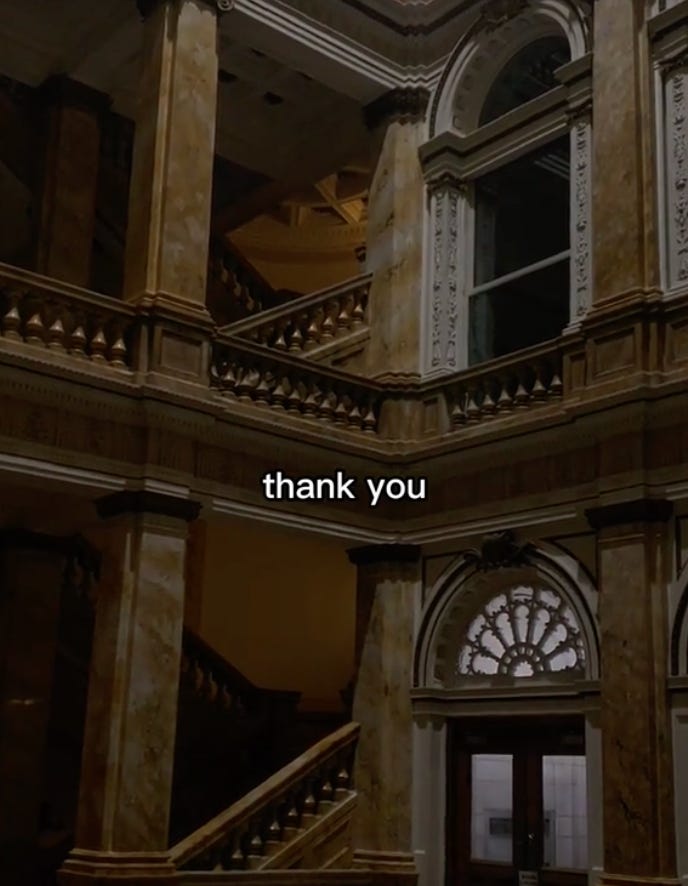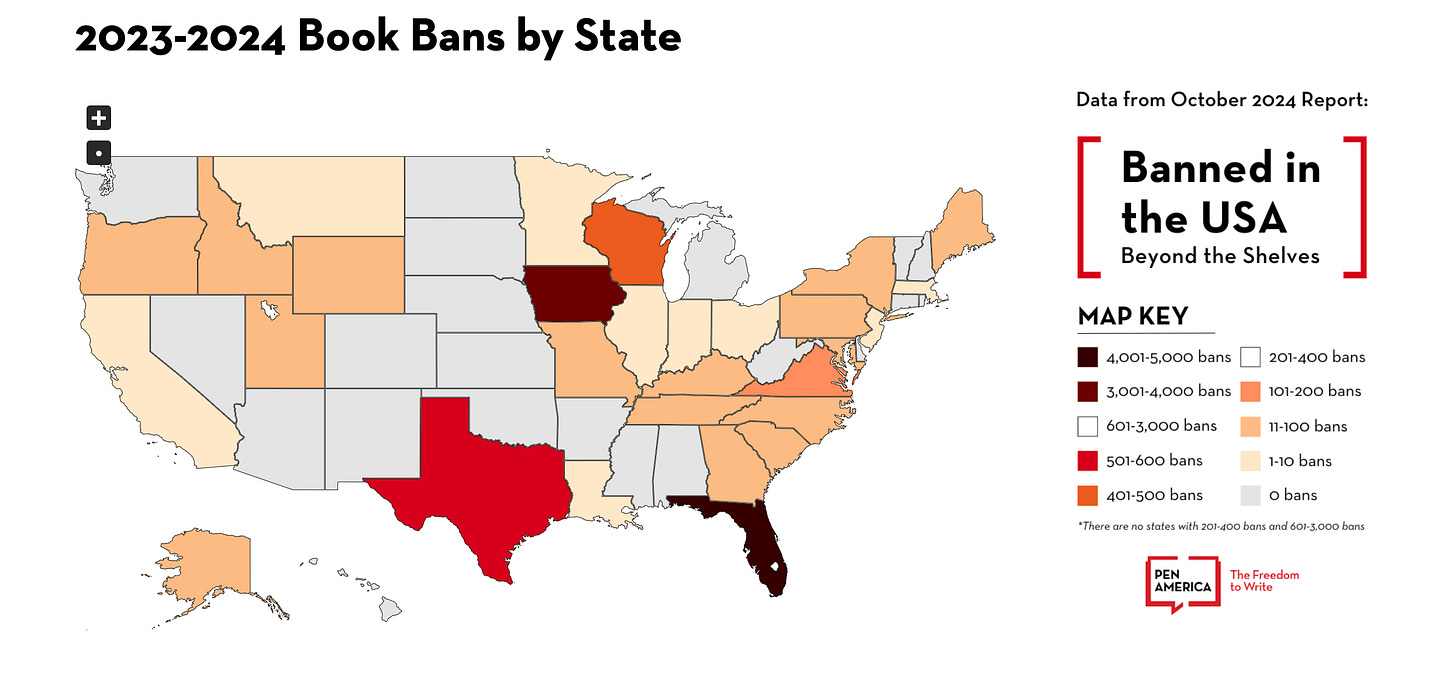When libraries go dark
The symbolism of turning the lights off in our libraries and the warning that holds for censorship and control in the United States.
On Saturday, the Milwaukee Public Library (my old library and deserved TikTok sensation) posted a TikTok where they walked through the rooms of the 19th century Milwaukee Central Library and turned off the lights, switching each and every room into darkness.
While the TikTok may have been a sorrow goodbye to the platform, the symbolism struck a deeper cord. As a former English teacher, I heard all the time that unpacking symbolism was trying too hard to see something that wasn’t there (I like to think I taught my students otherwise in the end). But unpacking symbolism helps us disover truth. And this particular symbolism of the MPL TikTok brings light (or I suppose, darkness) to the future of libraries.

Earlier this year, I wrote about an Idaho law looking to place “adult” books in a separate area of libraries, not accessible to anyone under the age of 18. This kind of censorship has been rising for the last ten years in our country and not just in our libraries.
I quit teaching back in 2018 due to never-ending scrutiny from my administration and increased observations in my classroom. I taught debate to 17-18 year olds in Wisconsin. In order to properly educate my students on how to form their own opinions based off of primary and unbiased sources, I made sure that my students openly talked about and learned how to have productive discussions on all topics: race, abortion, international relations, gun laws, etc. I never told my students what to believe, but gave them the tools to form their own opinions. This didn’t make everyone happy.
And while I wish I could have fought harder for my student’s right to learn, my own mental health was suffering and I saw the writing on the wall: if I continued to teach what my students needed, then I would no longer be allowed to teach.
In fact, in the years that followed in my district, one teacher was suspended due to displaying a rainbow flag in her classroom; another was fired for teaching her students a song called “Rainbowland”; and the teacher that replaced me was given a warning for receiving a grant to put diverse books in her classroom.
This goes beyond symbolism. This is a warning.
The most important tools we have as individuals is the power of education and knowledge. Knowledge weakens propaganda and takes away its power. Our government (and governments of history) know this all too well.
It’s not a coincidence that one of the first steps of any fascist government is to destroy or take away books from the general public.
Throughout history, authoritarian governments have banned books to silent dissent under the guise of protecting people from “obscenity”. Some historical instances include:
The Nazi book burnings of the 1930s, in which books were burned that opposed Nazi ideologies, resulting in a cultural genocide.
The Soviet Union banned pre-revolutionary texts from libraries.
In 1973, the dictatorial government of Augusto Pinochet burned leftist and Marxist literature, sometimes executing those who owned them.
In 1981, the Jaffna Public Library was burned to the ground, destroying nearly 100,000 volumes and destroying records of Tamil culture.
During the Bosnian genocide in 1992, Serbian forces set the National Library of Bosnia and Herzegovnia on fire, killing anyone who tried to rescue what was inside. 1.5 million books were destroyed.
Over the past two years, we’ve witnessed another cultural genocide as 13 public libraries were destroyed throughout Gaza.
The United States is currently on this path.
In the 2023-2024 school year, PEN America reported 10,046 instances of book bans. This number tripled from the previous school year.

Idaho isn’t the first nor is it the last state to try to impose laws around information access. According to the American Library Association:
“A primary goal of the library profession is to facilitate access to all points of view on current and historical issues. All proposals for restricted access should be carefully scrutinized to ensure that the purpose is not to suppress a viewpoint or to place a barrier between users and content. Libraries must maintain policies and procedures that serve the diverse needs of their users and protect the First Amendment right to receive information.”
And of course, the TikTok ban wasn’t built out of fear for our data. It was banned due to the way the platform’s algorithm allowed for increased education, the spreading of knowledge, and effective organizing.
All of these measures are designed to take away power from anyone not in the ruling class. We have to make sure we resist and hold onto our power. One of the most revolutionary acts of resistance you can partake in right now is educating yourself. Read books. Read a lot of them. Read articles from independent journalists. Follow these journalists on social media. Read Substacks (which you’re already doing, thank you).
In order to support your library, get a library card. Get a new library card every time you move. By doing this, this increases patron numbers which can directly help increase library funding.
If your school district is imposing or talking about book bans, go to your school board meetings. Make your voices heard. Follow RachelwithReads to get inspired.
But, most importantly, keep learning. If you don’t know where to start, I’ve created syllabuses for Palestine, Resistance, and the Climate Crisis (more to come soon).
Through this education, we’re not only able to identify patterns and propaganda techniques, we’re also able to learn how to organize effectively.
The Milwaukee Public Library showed us what the world would look like if we were forced to turn off the lights. It’s time to turn them back on.


